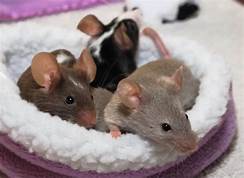Do Pet Mice Bite? (and Why?)
Mice are popular pets, and they can make great companions. They're small, furry, and playful, and they're relatively easy to care for. However, one common question about pet mice is whether or not they bite. The answer is yes, pet mice can bite, but it's important to remember that they don't typically do so without a reason.

Why Do Pet Mice Bite?
There are a few reasons why a pet mouse might bite. These include:
1. Fear or Defense: Mice are prey animals, and they may bite if they feel threatened or cornered. This is especially true if they're new to your home and haven't had a chance to get used to you yet.
2. Handling: If you handle your mouse too roughly, they may bite out of pain or fear. It's important to be gentle when handling your mouse, and to avoid picking them up by the tail.
3. Playfulness: Mice are playful creatures, and they may sometimes bite as a way to play. This is usually a gentle bite, and it's not meant to cause harm. However, it's important to teach your mouse that biting is not an acceptable way to play.
4. Hunger or Thirst: If your mouse is hungry or thirsty, they may bite you in an attempt to get your attention. Make sure that your mouse has access to food and water at all times.
5. Illness or Injury: If your mouse is sick or injured, they may bite out of pain or discomfort. It's important to take your mouse to the vet if you think they're sick or injured.
How to Prevent Mouse Bites
There are a few things you can do to prevent your mouse from biting. These include:
1. Handle Your Mouse Properly: Always handle your mouse gently. Avoid picking them up by the tail, and be careful not to squeeze or pinch them. If your mouse tries to bite you, don't pull your hand away. Instead, stay calm and gently push your mouse away.
2. Socialize Your Mouse: The more socialized your mouse is, the less likely they are to bite. Spend time playing with your mouse and talking to them. You can also socialize your mouse by letting them explore your home under your supervision.
3. Provide Your Mouse with Plenty of Toys: Mice need mental and physical stimulation to stay happy and healthy. Provide your mouse with a variety of toys to play with, such as balls, tunnels, and chew toys. This will help to keep them from getting bored and biting out of frustration.
4. Feed and Water Your Mouse Regularly: Make sure that your mouse has access to food and water at all times. This will help to prevent them from biting you out of hunger or thirst.
5. Take Your Mouse to the Vet Regularly: If you think your mouse is sick or injured, take them to the vet right away. This will help to prevent them from biting out of pain or discomfort.
What to Do If Your Mouse Bites You
If your mouse does bite you, don't panic. Here's what to do:
1. Wash the Bite Wound: Immediately wash the bite wound with soap and water. This will help to prevent infection.
2. Apply Pressure to the Bite Wound: Apply pressure to the bite wound to stop the bleeding.
3. Seek Medical Attention: If the bite wound is deep or if you have any concerns about infection, seek medical attention immediately.
4. Monitor Your Mouse: Keep an eye on your mouse after they've bitten you. If they show any signs of illness or aggression, take them to the vet right away.
Declaration: All article resources on this website, unless otherwise specified or labeled, are collected from online resources. If the content on this website infringes on the legitimate rights and interests of the original author, you can contact this website to delete it.





